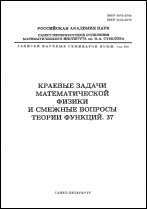|
|
Zapiski Nauchnykh Seminarov POMI, 2005, Volume 322, Pages 63–75
(Mi znsl393)
|
 |
|
 |
On an exponential sum
P. Ding
Simon Fraser University
Abstract:
Let $p$ be a prime number, $n$ be a positive integer, and $f(x) = ax^k+bx$. We put
$$
S(f,p^n)=\sum_{x=1}^{p^n}e\biggl(\frac{f(x)}{p^n}\biggr),
$$
where $e(t)=\exp(2\pi it)$. This special exponential sum has been widely studied in connection with Waring's problem. We write $n$ in the form $n=Qk+r$, where $0\le r\le k-1$ and $Q\ge 0$. Let $\alpha=\operatorname{ord}_p(k)$, $\beta=\operatorname{ord}_p(k-1)$, and $\theta=\operatorname{ord}_p(b)$. We define
$$
\mathcal Q=\begin{cases}
\dfrac{\theta-\alpha}{k-1},&\text{если }\theta\ge\alpha,
\\
0,&\text{иначе},
\end{cases}
$$
and $J=[\zeta]$. Moreover, we denote $V=\min(Q,J)$. Improving the preceding result, we establish the theorem.
Theorem. Let $k\ge 2$ and $n\ge 2$. If $p>2$, then
$$
|S(f,p^n)|\le\begin{cases}
p^{\frac{1-V}2}p^{\frac n2}(b,p^n)^{\frac12},&\text{if }n\equiv 1\pmod k,
\\
(k-1,p-1)p^{-\frac V2}p^{\frac{\min(\alpha,1)}2}p^{\min(\frac\beta2,\frac n2-1)}p^{\frac n2}(b,p^n)^{\frac12}, &\text{if }n\not\equiv 1\pmod k.
\end{cases}
$$
An example showing that this result is best possible is given. Bibliography: 15 titles.
Received: 03.02.2005
Citation:
P. Ding, “On an exponential sum”, Proceedings on number theory, Zap. Nauchn. Sem. POMI, 322, POMI, St. Petersburg, 2005, 63–75; J. Math. Sci. (N. Y.), 137:2 (2006), 4645–4653
Linking options:
https://www.mathnet.ru/eng/znsl393 https://www.mathnet.ru/eng/znsl/v322/p63
|

|




 Contact us:
Contact us: Terms of Use
Terms of Use
 Registration to the website
Registration to the website Logotypes
Logotypes








 Citation in format
Citation in format 